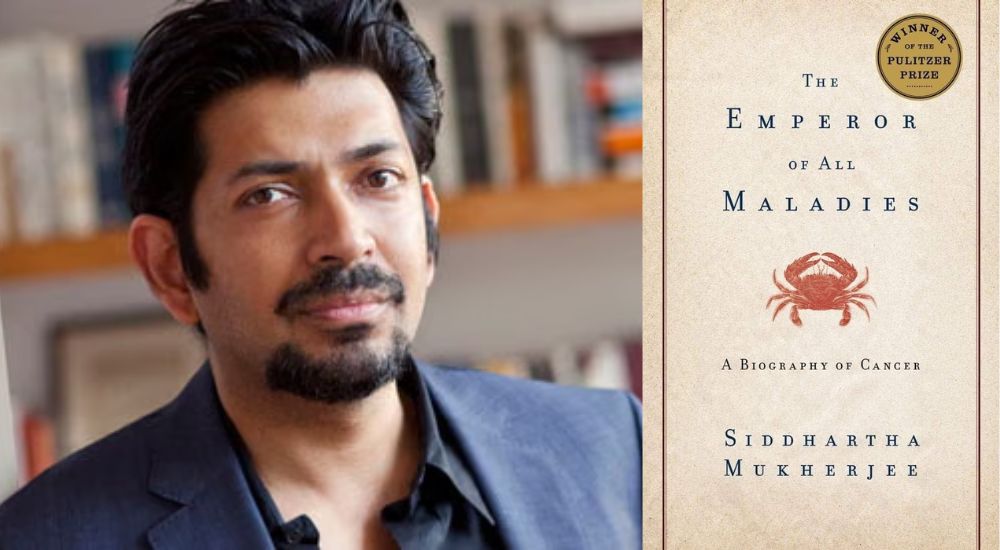The Emperor of All Maladies: A Biography of Cancer — A Landmark in Medical Literature

In the vast realm of medical writing, The Emperor of All Maladies stands apart. Not just as a book about cancer, but as a biography of a disease, chronicling the centuries-long war humanity has waged against one of its most relentless foes. Written by Dr. Siddhartha Mukherjee, a Harvard and Oxford-educated physician and oncologist, this Pulitzer Prize-winning book is a powerful blend of science, history, biography, and human emotion.
Why This Book Matters
Cancer touches almost everyone — as a patient, caregiver, survivor, or loved one. Yet few understand its history, complexity, and cultural impact. Mukherjee’s work fills this gap with remarkable clarity and compassion.
He writes not just as a doctor, but as a storyteller who brings scientific rigor and narrative elegance to the deeply personal and often terrifying world of cancer.
What Is the Book About?
Described by the author as a “biography of cancer”, the book:
- Traces the first recorded cases of cancer in ancient Egypt.
- Examines how the understanding of cancer evolved — from mysticism to scientific scrutiny.
- Chronicles the key milestones in cancer research: chemotherapy, radiation, surgery, genetics, and immunotherapy.
- Introduces pioneers in oncology, from Sidney Farber (father of modern chemotherapy) to Mary Lasker (crusader for cancer research funding).
- Discusses the sociopolitical dynamics that shaped cancer care, especially the U.S. “War on Cancer” launched in the 1970s.
- Follows the author’s own experiences as an oncologist, treating leukemia patients and confronting ethical and emotional dilemmas.
Scientific Depth and Accessibility
One of the greatest strengths of the book is its accessibility without sacrificing depth. Mukherjee manages to explain:
- Cell biology and mutations
- DNA and the genetics of cancer
- The mechanism of tumor formation and metastasis
- Clinical trial processes and ethical challenges
- Modern innovations like targeted therapies and immunotherapy
This makes the book equally valuable to general readers, medical students, and healthcare professionals
Key Themes in the Book
1. Cancer as a Biological and Social Phenomenon
Cancer is not just a disease of cells, but also one of societal structures, funding priorities, and human behavior. Mukherjee shows how politics, economics, and public opinion have shaped the pace and direction of research.
2. Human Resilience
The book is filled with personal stories — patients who fight, endure, and sometimes succumb. Their courage underscores the profound human aspect of medicine.
3. Hope and Limitations
While acknowledging cancer’s adaptability and aggressiveness, the book never loses sight of the hope in ongoing research, the lives saved, and the progress made.
Recognition and Awards
- Pulitzer Prize for General Nonfiction (2011)
- Named one of the 100 most influential books of the decade by The Times
- Adapted into a PBS documentary by Ken Burns
Why It’s a Must-Read for Everyone Interested in Medicine
- Medical Professionals: Offers historical grounding and clinical insight.
- Patients & Caregivers: Helps demystify the disease.
- Researchers & Policy Makers: Contextualizes the importance of sustained funding and collaboration.
- General Public: Provides awareness, understanding, and empathy.
Scientific Backing and Real-World Relevance
The book references decades of clinical trials, molecular research, and epidemiological data, including work published in:
- The Lancet
- New England Journal of Medicine
- Journal of Clinical Oncology
- PubMed databases
- U.S. National Cancer Institute (NCI)
Legacy and Impact
Mukherjee’s book has inspired:
- Greater public understanding of cancer
- Renewed funding and attention to cancer research
- Thousands of healthcare professionals to rethink their role in the patient journey
Conclusion: A Book That Humanizes Science
The Emperor of All Maladies is more than a book — it’s a monumental achievement in medical literature. It captures the tragedy, triumph, and tenacity of the human fight against cancer. For those who want to understand medicine not just through facts, but through human stories and scientific insight, this book is a masterpiece.




